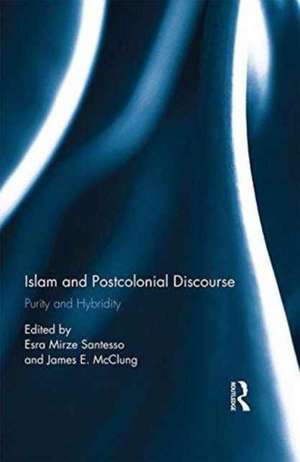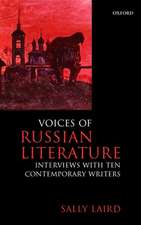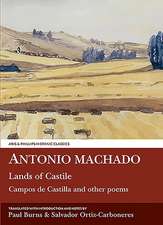Islam and Postcolonial Discourse: Purity and Hybridity
Autor Esra Mirze Santesso, James McClungen Limba Engleză Hardback – 14 feb 2017
| Toate formatele și edițiile | Preț | Express |
|---|---|---|
| Paperback (1) | 389.38 lei 6-8 săpt. | |
| Taylor & Francis – 12 dec 2019 | 389.38 lei 6-8 săpt. | |
| Hardback (1) | 1057.09 lei 6-8 săpt. | |
| Taylor & Francis – 14 feb 2017 | 1057.09 lei 6-8 săpt. |
Preț: 1057.09 lei
Preț vechi: 1289.13 lei
-18% Nou
Puncte Express: 1586
Preț estimativ în valută:
202.33€ • 210.43$ • 169.55£
202.33€ • 210.43$ • 169.55£
Carte tipărită la comandă
Livrare economică 13-27 martie
Preluare comenzi: 021 569.72.76
Specificații
ISBN-13: 9781472465443
ISBN-10: 147246544X
Pagini: 272
Ilustrații: 2
Dimensiuni: 152 x 229 mm
Greutate: 0.52 kg
Ediția:1
Editura: Taylor & Francis
Colecția Routledge
Locul publicării:Oxford, United Kingdom
ISBN-10: 147246544X
Pagini: 272
Ilustrații: 2
Dimensiuni: 152 x 229 mm
Greutate: 0.52 kg
Ediția:1
Editura: Taylor & Francis
Colecția Routledge
Locul publicării:Oxford, United Kingdom
Cuprins
Table of Contents:
K. Merinda Simmons
"Baghdad, Beirut, and Brooklyn: Communal and Transnational Visions in Muslim and Arab American Poetry after September 11"
Levin Arnsperger
"Coming out for Islam? Critical Muslim Responses to Postcolonialism in Theory and Writing"
Nath Aldalala’a and Geoffrey P. Nash
- Foreword
Claire Chambers
- Introduction
Esra Mirze Santesso
- History of the Muslim Other
"Saracens in Middle English Romance"
Janice Hawes
"The Two Faced Muslim in the Early Modern Imagination: The Cultural Genealogy of a Modern Political Dialectic"
Imtiaz Habib - Secularism and Islamopolitics
"Naguib Mahfouz’s Cairo Trilogy: Mediating Secularism in Postcolonial Egypt"
Rehnuma Sazzad
"Unmasking Allah: The Violence of Religious Theater in Nawal El Saadawi’s God Dies by the Nile"
Rajesh Reddy
"The Terror of Symbols: Colonialism, Secularism, and Islam in Cheikh Hamidou Kane’s Ambiguous Adventure and Amitav Ghosh’s In an Antique Land"
Vincent van Bever Donker - Female Agency and Subversion
"Untranslatable Acts: ‘Veiling’ and the Aporias of Transnational Feminism"
Munia Bhaumik
"Sex and the City of Riyadh: Postfeminist Fabrication"
Jean Kane - Islamophobia
"Islamophobia and its Discontents"
Tahir Abbas
"British Asian Muslim Radicalization: Narratives of Travelling Justice/Injustice"
Chloé A. Gill-Khan
"Mistaken Identities: Performances of Post 9/11 Scenarios of Fear and Terror in the US"
Ketu H. Katrak
"From Nawab to Jihadi: The Transformation of Muslim Identity in Popular Indian Cinema"
Alpana Sharma - Postsecular Re-thinking
K. Merinda Simmons
"Baghdad, Beirut, and Brooklyn: Communal and Transnational Visions in Muslim and Arab American Poetry after September 11"
Levin Arnsperger
"Coming out for Islam? Critical Muslim Responses to Postcolonialism in Theory and Writing"
Nath Aldalala’a and Geoffrey P. Nash
Notă biografică
Esra Mirze Santesso is Associate Professor and Associate English Department Head at the University of Georgia, USA.
James E. McClung is the Director of UGA at Oxford Study Abroad Program and Residential Centre, and holds a Doctoral degree in English Literature from the University of Georgia, USA.
James E. McClung is the Director of UGA at Oxford Study Abroad Program and Residential Centre, and holds a Doctoral degree in English Literature from the University of Georgia, USA.
Descriere
Largely, though not exclusively, as a legacy of the 2001 attack on the World Trade Center, Islamic faith has become synonymous in many corners of the media and academia with violence, which many believe to be its primary mode of expression. Responding to the growing importance of religion, specifically Islam, as a cultural signifier in the formation of postcolonial subjectivity, this collection enlarges our understanding of the full range of experiences within Islam as well as the figure of the Muslim.

















